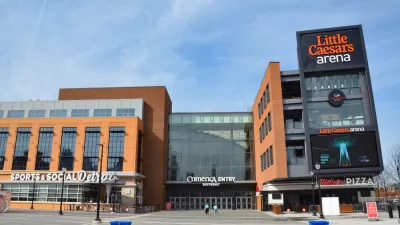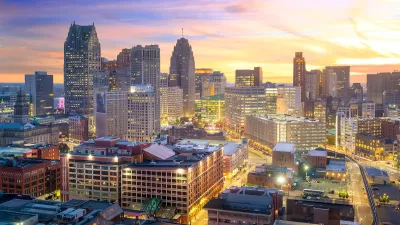The Detroit project was slated to become a massive sports and entertainment district. After five years, little has changed.

Tom Perkins reports on the current status of the District Detroit, a 50-block area near downtown that includes Little Caesar's Arena. Detroit's wealthy Ilitch family owns the arena along with many of the derelict properties in the area. In 2013, the family proposed a plan to turn the neighborhood around. "The Ilitches promised $200m in development around the arena, claiming new housing, stores, restaurants, bars and offices would bloom," says Perkins.
Even with a big tax break from the city, very little has happened in the last five years. "Instead of gaining luxury lofts, [the District Detroit] lost housing, and the Ilitches have only renovated a small fraction of the hundreds of properties its companies purchased here," according to Perkins.
Not only has the area failed to improve; in some ways its condition has deteriorated even more, says Perkins:
On blocks where historic buildings once stood, they have laid dozens of surface parking lots. Those are controversial because the Ilitches charge up to $50 per spot, and a vast stretch of once-dense downtown real estate is now a sea of Ilitch-owned parking spaces.
While the project did not draw upon the city's general fund, Perkins notes that the Detroit did give up substantial tax revenue from arena operations–what could have amounted to more than $336 million for the general fund.
Critics say the city cut a bad deal, with little oversight or accountability, implying that the lack of progress in the District Detroit is not necessarily a surprise. Residents and business owners are now skeptical after seeing little action, but they are still hoping improvements will come.
FULL STORY: Big promises for a thriving urban core in Detroit vanish in a swath of parking lots

Planetizen Federal Action Tracker
A weekly monitor of how Trump’s orders and actions are impacting planners and planning in America.

Map: Where Senate Republicans Want to Sell Your Public Lands
For public land advocates, the Senate Republicans’ proposal to sell millions of acres of public land in the West is “the biggest fight of their careers.”

Restaurant Patios Were a Pandemic Win — Why Were They so Hard to Keep?
Social distancing requirements and changes in travel patterns prompted cities to pilot new uses for street and sidewalk space. Then it got complicated.

Albuquerque Route 66 Motels Become Affordable Housing
A $4 million city fund is incentivizing developers to breathe new life into derelict midcentury motels.

DC Area County Eliminates Bus Fares
Montgomery County joins a growing trend of making transit free.

Platform Pilsner: Vancouver Transit Agency Releases... a Beer?
TransLink will receive a portion of every sale of the four-pack.
Urban Design for Planners 1: Software Tools
This six-course series explores essential urban design concepts using open source software and equips planners with the tools they need to participate fully in the urban design process.
Planning for Universal Design
Learn the tools for implementing Universal Design in planning regulations.
Heyer Gruel & Associates PA
JM Goldson LLC
Custer County Colorado
City of Camden Redevelopment Agency
City of Astoria
Transportation Research & Education Center (TREC) at Portland State University
Camden Redevelopment Agency
City of Claremont
Municipality of Princeton (NJ)





























